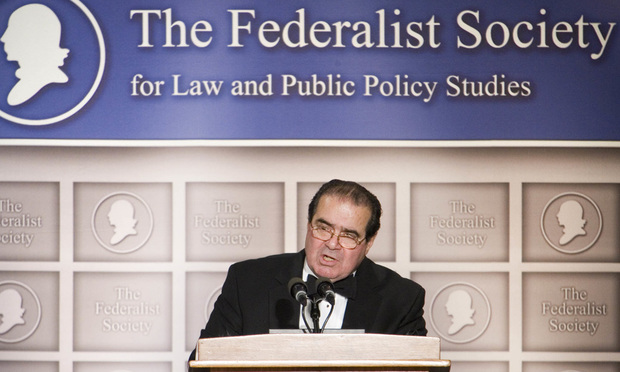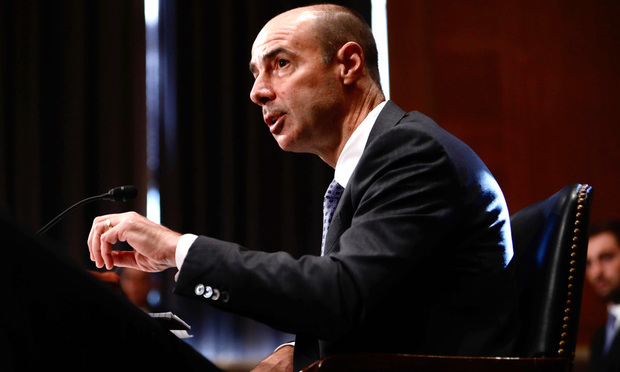Inside Antonin Scalia's FBI File
The 483 pages posted this month on the FBI's online vault reveal FBI interviews with colleagues, friends and neighbors. Scalia's voice appears fleetingly in the file.
January 08, 2020 at 02:44 PM
7 minute read
 The late Justice Antonin Scalia speaking at The Federalist Society's 25th anniversary gala in 2007. Credit: Diego M. Radzinschi / ALM
The late Justice Antonin Scalia speaking at The Federalist Society's 25th anniversary gala in 2007. Credit: Diego M. Radzinschi / ALM
Nearly four years after the death of U.S. Supreme Court Justice Antonin Scalia, the FBI recently released its files on Scalia, offering a peek inside the confirmation process for his circuit court and Supreme Court nominations.
The 483 pages of documents posted this month on the FBI's online vault also reveal communications about a possible ethics investigation in 1993 and a purported death threat in 2006 from someone who called Scalia an "anti-Christ."
It is routine for the FBI files of prominent figures to be released publicly—though filled with redactions—after their death, in response to Freedom of Information Act requests.
Scalia's file features observations from government officials, colleagues, law professors and neighbors, all of whom were interviewed by the FBI as part of the background check process. Names of individuals, however, are shielded from public view. There are also many newspaper clippings discussing Scalia's nomination to the high court. He was confirmed 98-0 in 1986.
Scalia's voice appears fleetingly in the FBI file, released on Jan. 3. He was asked at one point, in a written submission, about whether he had ever been a party in any civil court action. He responded: "In about 1976 (I am very uncertain of the date) I filed an action in small claims court in the District of Columbia to recover for damages done to my car by a parking garage. I prevailed."
What follows are some of the notable nuggets culled from the FBI's Scalia file:
>> Scalia the writer: The FBI in April 1982 contacted the U.S. solicitor general's office about Scalia's consideration for the D.C. Circuit. The unidentified reference described Scalia as "one of the top twelve lawyers in the nation." And on his writing: Scalia "writes with clarity and fine style, which is readable, persuasive and entertaining." Scalia, of course, was widely regarded as one of the strongest writers on the Supreme Court. "Justice Scalia's opinions mesmerize law students. And why should they not? The captivating style, full of wit, dash, and verve," Justice Elena Kagan said in 2016, after Scalia's death. She added: "As a sheer writer, I think, Justice Scalia belongs in the company of Justices Holmes, Brandeis, and Jackson."
>> Ethics investigation: The FBI considered—but did not actually undertake—an ethics investigation in 1992 at the behest of an unnamed person who was concerned that Scalia participated in a Supreme Court case in which one of the parties had recently paid him an honorarium. The complainant cited a USA Today report (co-authored by Tony Mauro) that in the 1988 case of Shapero v. Kentucky Bar Association, Scalia did not state in his financial disclosure form that the bar association had paid $2,500 for a speech he gave, though the University of Kentucky law school wrote the check. The FBI found that the bar association, in fact, had paid for half of the honorarium and considered launching an Ethics in Government Act investigation. For reasons that were redacted, the case was "administratively closed."
>> Scalia, a media critic: In the 1986 vetting of Scalia for his nomination as a Supreme Court justice, almost all of the FBI interviews of people who knew him were glowingly positive. His temperament and legal acumen were widely praised. One person who was interviewed, however, had somewhat mixed views. The University of North Carolina School of Law professor told the agent that Scalia had "a reputation for fairness although he is strong-willed and holds strong beliefs." The professor also stated that Scalia "has a reputation in judicial circles of being against the media, no friend of the First Amendment and … questions the media's right to question public officials." The professor's name was redacted, but other clues in the interview report make it clear that it was Eugene Gressman, a renowned constitutional scholar who died in 2010. One of the newspaper clippings in the file was a 1986 New York Times op-ed written by R. Emmet Tyrrell, then editor of The American Spectator. Tyrrell urged the would-be justice not to take any steps to make it easier to sue for libel. "To do so would be a grave mistake," Tyrrell wrote.
>> Scalia and the Federalist Society: Scalia's FBI file included a 1986 Washington Times piece titled "The society that has liberals talking scared." The piece name-drops then-current and former members, including Scalia, who had served as the group's first faculty adviser for the University of Chicago chapter. The piece teed up a debate that has gripped legal circles in Washington ever since: the broad influence of the Federalist Society. The piece noted: "Detractors say the Federalist Society is a menace. If it succeeds as a networking operation—there is evidence it already has—it could produce a tight web of powerful lawyers and judges bent on the disruption, if not the undoing, of more than 30 years of activist U.S. jurisprudence."
>> A threat investigation: In 2006, the FBI received a report that an unnamed individual had posted on an AOL message board a threat to physically harm Scalia. The posted stated, in all-capitals, "Scalia is the Fucking Anti-Christ." The author of the posting was traced to North Carolina. The unnamed person told an agent that "the message was satire, and that he had no intention of harming Justice Scalia." The agent admonished the person not to post a similar threat again, or "it could be considered threatening and could possibly lead to federal criminal charges filed against him." The case was closed.
 Eugene Scalia testifies at his confirmation hearing for U.S. labor secretary. Credit: Diego M. Radzinschi / ALM
Eugene Scalia testifies at his confirmation hearing for U.S. labor secretary. Credit: Diego M. Radzinschi / ALM>> "Scalia trivia": In 1986, shortly after Reagan announced Scalia's nomination to the Supreme Court, "the search for Scalia trivia has turned into something of a Washington parlor game," a New York Times blurb, included in the FBI file, stated. Did you know, the item said, that one of Scalia's nine children was, at the time, a 22-year-old writer and researcher at the U.S. Labor Department? That son, Eugene Scalia, now runs the place.
Read more:
'Laughter Is a Blood Sport' at the Supreme Court, Scholars Say in New Study
Labor Appointee Eugene Scalia Earned $6.2M as Gibson Dunn Partner
Antonin Scalia Hated Acronyms Anyway
When Scalia Turned My Name Into an Adjective
Looking Back at Scalia's Controversial 'Long Game'
Scalia's Death at Private Ranch Highlights Tension Over Justices' Travel
This content has been archived. It is available through our partners, LexisNexis® and Bloomberg Law.
To view this content, please continue to their sites.
Not a Lexis Subscriber?
Subscribe Now
Not a Bloomberg Law Subscriber?
Subscribe Now
NOT FOR REPRINT
© 2025 ALM Global, LLC, All Rights Reserved. Request academic re-use from www.copyright.com. All other uses, submit a request to [email protected]. For more information visit Asset & Logo Licensing.
You Might Like
View All

'A Warning Shot to Board Rooms': DOJ Decision to Fight $14B Tech Merger May Be Bad Omen for Industry

'Incredibly Complicated'? Antitrust Litigators Identify Pros and Cons of Proposed One Agency Act
5 minute readLaw Firms Mentioned
Trending Stories
- 1Uber Files RICO Suit Against Plaintiff-Side Firms Alleging Fraudulent Injury Claims
- 2The Law Firm Disrupted: Scrutinizing the Elephant More Than the Mouse
- 3Inherent Diminished Value Damages Unavailable to 3rd-Party Claimants, Court Says
- 4Pa. Defense Firm Sued by Client Over Ex-Eagles Player's $43.5M Med Mal Win
- 5Losses Mount at Morris Manning, but Departing Ex-Chair Stays Bullish About His Old Firm's Future
Who Got The Work
J. Brugh Lower of Gibbons has entered an appearance for industrial equipment supplier Devco Corporation in a pending trademark infringement lawsuit. The suit, accusing the defendant of selling knock-off Graco products, was filed Dec. 18 in New Jersey District Court by Rivkin Radler on behalf of Graco Inc. and Graco Minnesota. The case, assigned to U.S. District Judge Zahid N. Quraishi, is 3:24-cv-11294, Graco Inc. et al v. Devco Corporation.
Who Got The Work
Rebecca Maller-Stein and Kent A. Yalowitz of Arnold & Porter Kaye Scholer have entered their appearances for Hanaco Venture Capital and its executives, Lior Prosor and David Frankel, in a pending securities lawsuit. The action, filed on Dec. 24 in New York Southern District Court by Zell, Aron & Co. on behalf of Goldeneye Advisors, accuses the defendants of negligently and fraudulently managing the plaintiff's $1 million investment. The case, assigned to U.S. District Judge Vernon S. Broderick, is 1:24-cv-09918, Goldeneye Advisors, LLC v. Hanaco Venture Capital, Ltd. et al.
Who Got The Work
Attorneys from A&O Shearman has stepped in as defense counsel for Toronto-Dominion Bank and other defendants in a pending securities class action. The suit, filed Dec. 11 in New York Southern District Court by Bleichmar Fonti & Auld, accuses the defendants of concealing the bank's 'pervasive' deficiencies in regards to its compliance with the Bank Secrecy Act and the quality of its anti-money laundering controls. The case, assigned to U.S. District Judge Arun Subramanian, is 1:24-cv-09445, Gonzalez v. The Toronto-Dominion Bank et al.
Who Got The Work
Crown Castle International, a Pennsylvania company providing shared communications infrastructure, has turned to Luke D. Wolf of Gordon Rees Scully Mansukhani to fend off a pending breach-of-contract lawsuit. The court action, filed Nov. 25 in Michigan Eastern District Court by Hooper Hathaway PC on behalf of The Town Residences LLC, accuses Crown Castle of failing to transfer approximately $30,000 in utility payments from T-Mobile in breach of a roof-top lease and assignment agreement. The case, assigned to U.S. District Judge Susan K. Declercq, is 2:24-cv-13131, The Town Residences LLC v. T-Mobile US, Inc. et al.
Who Got The Work
Wilfred P. Coronato and Daniel M. Schwartz of McCarter & English have stepped in as defense counsel to Electrolux Home Products Inc. in a pending product liability lawsuit. The court action, filed Nov. 26 in New York Eastern District Court by Poulos Lopiccolo PC and Nagel Rice LLP on behalf of David Stern, alleges that the defendant's refrigerators’ drawers and shelving repeatedly break and fall apart within months after purchase. The case, assigned to U.S. District Judge Joan M. Azrack, is 2:24-cv-08204, Stern v. Electrolux Home Products, Inc.
Featured Firms
Law Offices of Gary Martin Hays & Associates, P.C.
(470) 294-1674
Law Offices of Mark E. Salomone
(857) 444-6468
Smith & Hassler
(713) 739-1250









